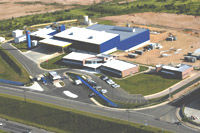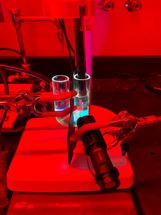Life Cycle Analysis of Evogene Castor Bean based Biodiesel Shows 90% Emissions Reduction Compared to Petroleum
Evogene Ltd. announced the results of a Life Cycle Assessment (LCA) of biodiesel produced from castor bean varieties being developed by the Company. The assessment shows that such biodiesel reduces Greenhouse Gases (GHG) emissions by 90% compared to petroleum diesel in the U.S. The results are based on Evogene's objectives for castor bean varieties, aimed at increasing crop yields to 4-5 ton/ha on semi-arid lands - at present focusing on Texas and Brazil - and therefore providing the additional benefit of not competing with food use of arable land.
The LCA was conducted by Symbiotic Engineering, a company specializing in GHG and sustainability management and providing tools to evaluate 'green' projects and products, and was peer-reviewed by Dr. Arunprakash Karunanithi from the University of Colorado, Denver.
"The results of the LCA strengthen our belief in castor bean as a viable and sustainable second-generation feedstock for biofuel production. Based on our project objectives, the castor bean varieties we are developing have a potential to address the immediate need for sustainable, widely available and cost efficient solutions for the biofuel industry," stated Mr. Assaf Oron, Evogene's EVP Strategy and Business Development. "We are keen to pursue the needs of the biofuel industry through castor bean breeding and evaluation of our varieties in field trials, recently established in Texas and Brazil."
The assessment evaluates the environmental impact of biodiesel produced from the castor bean varieties being developed by Evogene as compared to conventional petroleum diesel and biodiesel originating from soybean.
Results show that Evogene’s castor bean biodiesel production and use
- Reduces net GHG emissions by 90% in the U.S. and more than 75% in Brazil compared with conventional diesel, if grown in non-arable or semi-arid land.
- Exceeds the GHG savings achieved with soybean biodiesel, with reductions for the U.S. of 43% compared to soybean.
Most read news
Organizations
Other news from the department research and development

Get the chemical industry in your inbox
By submitting this form you agree that LUMITOS AG will send you the newsletter(s) selected above by email. Your data will not be passed on to third parties. Your data will be stored and processed in accordance with our data protection regulations. LUMITOS may contact you by email for the purpose of advertising or market and opinion surveys. You can revoke your consent at any time without giving reasons to LUMITOS AG, Ernst-Augustin-Str. 2, 12489 Berlin, Germany or by e-mail at revoke@lumitos.com with effect for the future. In addition, each email contains a link to unsubscribe from the corresponding newsletter.



























































